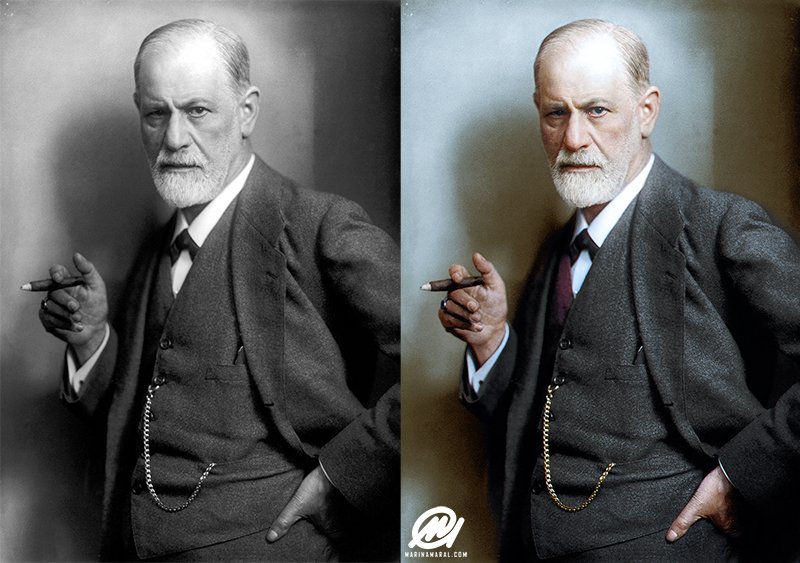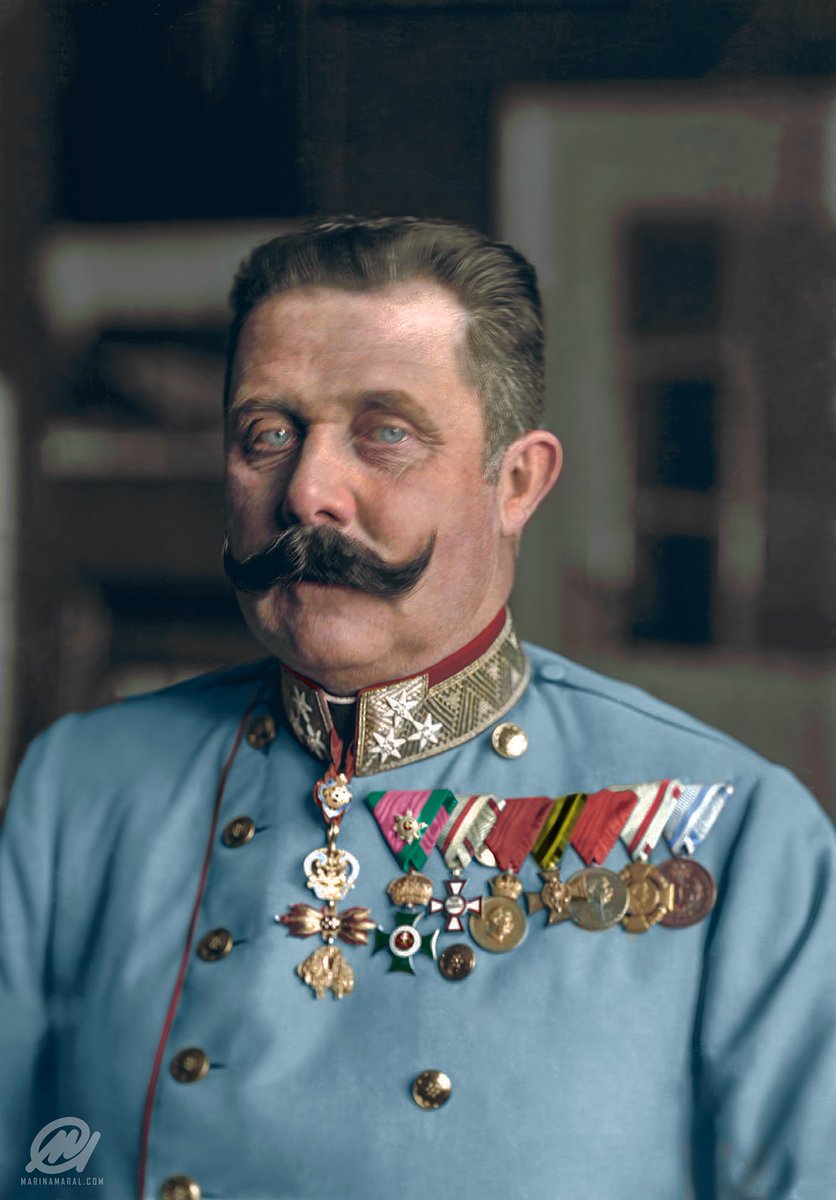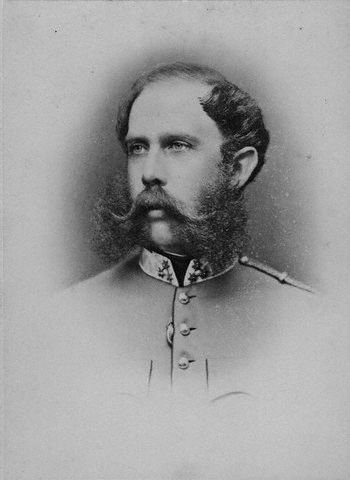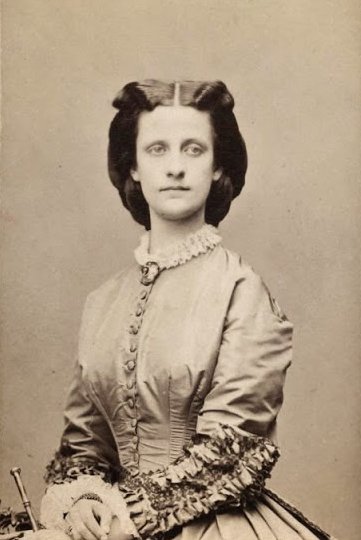Alexei Nikolaevich was born #OnThisDay in 1904. He was the youngest child and only son of Emperor Nicholas II and Empress Alexandra Feodorovna, and heir apparent to the throne of the Russian Empire. 
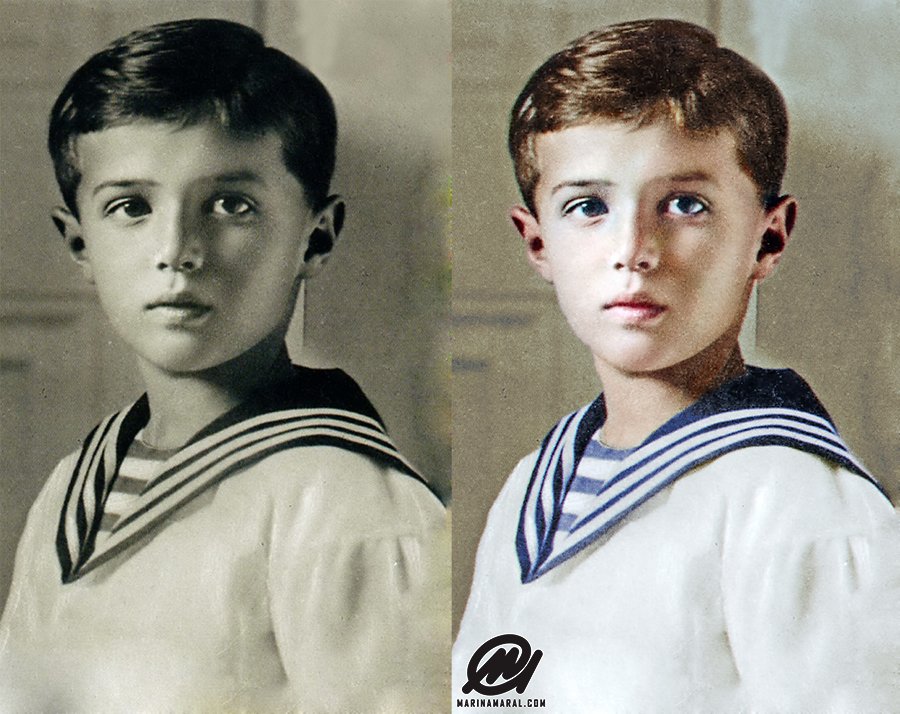
His older sisters were the Grand Duchesses Olga, Tatiana, Maria and Anastasia. He was doted on by his parents and sisters and known as "Baby" in the family. He was later also affectionately referred to as Alyosha (Алёша). 
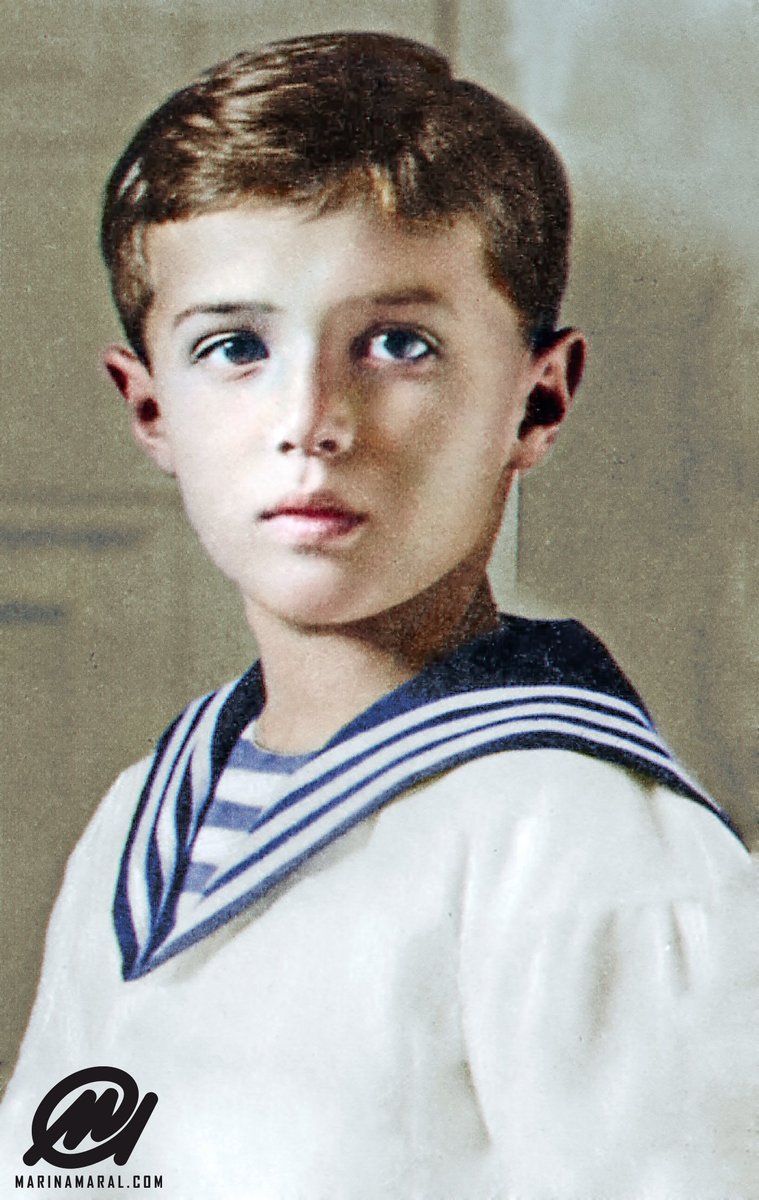
Alexei was christened on 3 September 1904 in the chapel in Peterhof Palace. His principal godparents were his paternal grandmother and his great-uncle, Grand Duke Alexei Alexandrovich. 

His other godparents included his oldest sister, Olga; his great-grandfather King Christian IX of Denmark; King Edward VII of the United Kingdom, the Prince of Wales and William II, German Emperor.
As Russia was at war with Japan, all active soldiers and officers of the Russian Army and Navy were named honorary godfathers.
Alexei inherited hemophilia from his mother Alexandra, a condition that could be traced back to her maternal grandmother Queen Victoria. In 2009 genetic analysis determined specifically that he suffered from hemophilia B. 

He had to be careful not to injure himself because he lacked factor IX, one of the proteins necessary for blood-clotting. According to his French tutor, Pierre Gilliard, the nature of his illness was kept a state secret. 

His hemophilia was so severe that trivial injuries such as a bruise, a nosebleed or a cut were potentially life-threatening.
Two navy sailors were assigned to him to monitor and supervise him to prevent injuries, which were still unavoidable.
Two navy sailors were assigned to him to monitor and supervise him to prevent injuries, which were still unavoidable.

They also carried him around when he was unable to walk. As well as being a source of constant torment to his parents, the recurring episodes of illness and long recoveries interfered greatly with Alexei's education.
In September 1912 the Romanovs were visiting their hunting retreat in the Białowieża Forest; on 5 September the young Tsesarevich jumped into a rowboat and hit one of the oarlocks. A large bruise appeared within minutes. Within a week the hematoma reduced in size.
In mid-September the family moved to Spała. On 2 October, after a drive in the woods, the "juddering of the carriage had caused still healing hematoma in his upper thigh to rupture and start bleeding again."
Alexei had to be carried out in an almost unconscious state.
Alexei had to be carried out in an almost unconscious state.
His temperature rose and his heartbeat dropped, caused by a swelling in the left groin. Alexandra barely left his bedside. A constant record was kept of the boy's temperature.
On 10 October, a medical bulletin appeared in the newspapers, and Alexei received the last sacrament.
On 10 October, a medical bulletin appeared in the newspapers, and Alexei received the last sacrament.

His condition improved at once, according to the Tsar. It's not exactly clear on which day, either 9, 10 or 11 October the Tsarina turned to her lady-in-waiting and best friend, Anna Vyrubova, to secure the help of the peasant healer, Rasputin, who at that time was out of favor).
According to his daughter Rasputin received the telegram on 12 October and the next day he responded with a short telegram, including the prophecy: "The little one will not die. Do not allow the doctors [Eugene Botkin and Vladimir Derevenko] to bother him too much." 

On 19 October his condition was considerably better and the hematoma disappeared, but Alexei had to undergo orthopedic therapy to straighten his left leg.
The Tsar had resisted the influence of Rasputin for a long time. At the beginning, he had tolerated him because he dare not weaken the Tsarina's faith in him – a faith which kept her alive.
He did not like to send him away for, if Alexei Nicolaievich had died, in the eyes of the mother he would have been the murderer of his own son.
There are various explanations for Rasputin's ability, such as that Rasputin hypnotized Alexei, administered herbs to him, or that his advice to the Tsarina not to let the doctors bother Alexei too much aided the boy's healing.
Others speculated that, with the information he got from his confidante at the court, lady-in-waiting Anna Vyrubova, Rasputin timed his interventions for when Alexei was on the road to recovery anyway, and claimed all the credit.
Court physician Botkin believed that Rasputin was a charlatan and his apparent healing powers arose from his use of hypnosis, but Rasputin was not interested in this practice before 1913 and his teacher Gerasim Papandato was expelled from St. Petersburg.
Felix Yusupov, one of Rasputin's enemies, suggested that he secretly drugged Alexei with Tibetan herbs which he got from quack doctor Peter Badmayev, but these drugs were politely rejected by the court. For Maria Rasputin, it was magnetism.
For Greg King, these explanations fail to take into account those times when Rasputin healed the boy, despite being 2600 km (1650 miles) away.
Historians speculated Rasputin's healing practice included halting the administration of aspirin, a pain-relieving analgesic available since 1899. Aspirin is an antiaggregant and has blood-thinning properties;
Alexei was well aware that he might not live to adulthood.
When he was ten, his older sister Olga found him lying on his back looking at the clouds and asked him what he was doing. "I like to think and wonder," Alexei replied. Olga asked him what he liked to think about.
When he was ten, his older sister Olga found him lying on his back looking at the clouds and asked him what he was doing. "I like to think and wonder," Alexei replied. Olga asked him what he liked to think about.
"Oh, so many things," the boy responded. "I enjoy the sun and the beauty of summer as long as I can. Who knows whether one of these days I shall not be prevented from doing it?" 
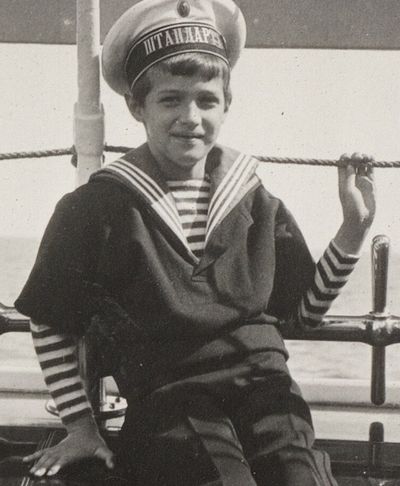
According to his French tutor, Alexei was a simple, affectionate child, but his environment was spoiling him by the "servile flattery" of the servants and "silly adulations" of the people around him.
Once, a deputation of peasants came to bring presents to Alexei. His personal attendant the sailor Derevenko, required they kneel before Alexei. Gilliard remarked that the Tsarevich was "embarrassed and blushed violently".
When asked if he liked seeing people on their knees before him, he said, "Oh no, but Derevenko says it must be so!" When Gilliard encouraged Alexei to "stop Derevenko insisting on it", he replied that he "dare not".
When Gilliard took the matter up with Derevenko, he said that Alexei was "delighted to be freed from this irksome formality".
"Alexei was the center of this united family, the focus of all its hopes and affections," wrote Gilliard. "His sisters worshipped him. He was his parents' pride and joy. When he was well, the palace was transformed. Everyone and everything in it seemed bathed in sunshine." 

Though intelligent and affectionate, his education was frequently interrupted by bouts of hemophilia and he was spoiled because his parents couldn't bear to discipline him.
He was prohibited from riding a bicycle or playing too roughly, but was naturally active.
He was prohibited from riding a bicycle or playing too roughly, but was naturally active.

As a small child, he occasionally played pranks on guests. One example occurred at a formal dinner party, where Alexei removed the shoe of a female guest from under the table, and showed it to his father.
Nicholas sternly told the boy to return the "trophy", which Alexei did after placing a large ripe strawberry into the toe of the shoe.
Courtiers reported that his illness made him sensitive to the hurts of others. During WWI, he lived with his father at army headquarters in Mogilev for long stretches of time and observed military life.
Alexei became one of the first Boy Scouts in Russia.
Alexei became one of the first Boy Scouts in Russia.

In December 1916, Major-General Sir John Hanbury-Williams, head of the British military at Stavka, received word of the death of his son in action with the British Expeditionary Force in France.
Tsar Nicholas sent twelve-year-old Alexei to sit with the grieving father. "Papa told me to come sit with you as he thought you might feel lonely tonight," Alexei told the general. 

Alexei, like all the Romanov men, grew up wearing sailor uniforms and playing at war from the time he was a toddler. His father began to prepare him for his future role as Tsar by inviting Alexei to sit in on long meetings with government ministers.
The Tsar's Colonel Mordinov remembered Alexei: "He had what we Russians usually call "a golden heart." He easily felt an attachment to people, he liked them and tried to do his best to help them, especially when it seemed to him that someone was unjustly hurt."
In one of his father's notes to his mother, he said "…Have come in from the garden with wet sleeves and boots as Alexei sprayed us at the fountain. It is his favorite game…peals of laughter ring out. I keep an eye, in order to see that things do not go too far." 

During World War I, Alexei even ate the soldiers' black bread, and refused when he was offered a meal that he would eat in his palace, saying "It's not what soldiers eat". 

British army officer Hanbury-Williams, whom Alexei liked, wrote:
"As time went on and his shyness wore off he treated us like old friends and… had always some bit fun with us. With me it was to make sure that each button on my coat was properly fastened ...
... a habit which naturally made me take great care to have one or two unbuttoned, in which case he used to at once to stop and tell me that I was 'untidy again,' give a sigh at my lack of attention to these details and stop and carefully button me up again."
The imperial family was arrested following the February Revolution of 1917, which resulted in the abdication of Nicholas II. When he was in captivity at Tobolsk, Alexei complained in his diary that he was "bored" and begged God to have "mercy" on him. 

As he became older, Alexei seemed to tempt fate and injure himself on purpose. While in Siberia, he rode a sled down the stairs of the prison house and injured himself in the groin.
The hemorrhage was very bad, and he was so ill that he could not be moved immediately when the Bolsheviks relocated his parents and older sister Maria to Yekaterinburg in April 1918.
He was confined to a wheelchair for the remaining weeks of his life.
He was confined to a wheelchair for the remaining weeks of his life.

The Tsarevich was less than a month shy of his fourteenth birthday when he was murdered on 17 July 1918 in the cellar room of the Ipatiev House in Yekaterinburg
The assassination was carried out by forces of the Bolshevik secret police under Yakov Yurovsky.
The assassination was carried out by forces of the Bolshevik secret police under Yakov Yurovsky.

According to one account of the murder, the family was told to get up and get dressed in the middle of the night because they were going to be moved. Nicholas II carried Alexei to the cellar room. His mother asked for chairs to be brought so that she and Alexei could sit down.
The firing squad first killed Nicholas, the Tsarina, and the two male servants. Alexei remained sitting in the chair, "terrified," before the assassins turned on him and shot at him repeatedly. 

The boy remained alive and the killers tried to stab him multiple times with bayonets. "Nothing seemed to work," wrote Yurovsky later. "Though injured, he continued to live."
Unbeknownst to the killing squad, the Tsarevich's torso was protected by a shirt wrapped in precious gems that he wore beneath his tunic.
Finally Yurovsky fired two shots into the boy's head, and he fell silent.
Finally Yurovsky fired two shots into the boy's head, and he fell silent.
For decades (until all the bodies were found and identified) conspiracy theorists suggested that one or more of the family somehow survived the slaughter. Several people claimed to be surviving members of the Romanov family following the assassinations.
On 23 August 2007, a Russian archaeologist announced the discovery of two burned, partial skeletons at a bonfire site near Yekaterinburg that appeared to match the site described in Yurovsky's memoirs.
The archaeologists said the bones are from a boy who was roughly between the ages of ten and thirteen years at the time of his death and of a young woman who was roughly between the ages of eighteen and twenty-three years old.
Along with the remains of the two bodies, archaeologists found "shards of a container of sulfuric acid, nails, metal strips from a wooden box, and bullets of various caliber." The bones were found using metal detectors and metal rods as probes.
Also, striped material was found that appeared to have been from a blue-and-white striped cloth.
Alexei commonly wore a blue-and-white striped undershirt.
Alexei commonly wore a blue-and-white striped undershirt.

On 30 April 2008, Russian forensic scientists announced that DNA testing had proven that the remains belong to the Tsarevich Alexei and to one of his sisters.
In 2000, Alexei and his family were canonized as passion bearers by the Russian Orthodox Church. The family had previously been canonized in 1981 by the Russian Orthodox Church Abroad as holy martyrs. 

The bodies of Tsar Nicholas II, Tsarina Alexandra, and three of their daughters were finally interred at St. Peter and Paul Cathedral in St. Petersburg on 17 July 1998—eighty years after they were murdered.
Alexei's remains, so as to be with those of his family, remain unburied due to the insistence of the Russian Orthodox Church on more DNA-testing. 

Alexei's hemophilia was integral to the rise of Grigori Rasputin.
One of the many things Rasputin did that unintentionally facilitated the fall of the Romanovs was to tell the Tsar that the war would be won once he (Tsar Nicholas II) took command of the Russian Army.
One of the many things Rasputin did that unintentionally facilitated the fall of the Romanovs was to tell the Tsar that the war would be won once he (Tsar Nicholas II) took command of the Russian Army.

Following this advice was a serious mistake as the Tsar had no military experience. The Tsarina, Empress Alexandra, a deeply religious woman, came to rely upon Rasputin and believe in his ability to help Alexei where conventional doctors had failed.
Tsarevich Alexei Island (Russian: Остров Цесаревича Алексея), later renamed Maly Taymyr, was named in honor of the Tsarevich of Russia by the 1913 Arctic Ocean Hydrographic Expedition led by Boris Vilkitsky on behalf of the Russian Hydrographic Service. 

Born: 12 August 1904
Peterhof Palace, St. Petersburg Governorate, Russian Empire
Died: 17 July 1918 (aged 13)
Ipatiev House, Yekaterinburg, Russian SFSR
Peterhof Palace, St. Petersburg Governorate, Russian Empire
Died: 17 July 1918 (aged 13)
Ipatiev House, Yekaterinburg, Russian SFSR

*Done*
The quality of the original photo wasn't the best, but I wanted to colorize and share it anyway. I hope you like it.
The quality of the original photo wasn't the best, but I wanted to colorize and share it anyway. I hope you like it.
"When I am dead, I will not hurt anymore, will it Mama? ... When I am dead, build me a little monument of stones in the woods." 
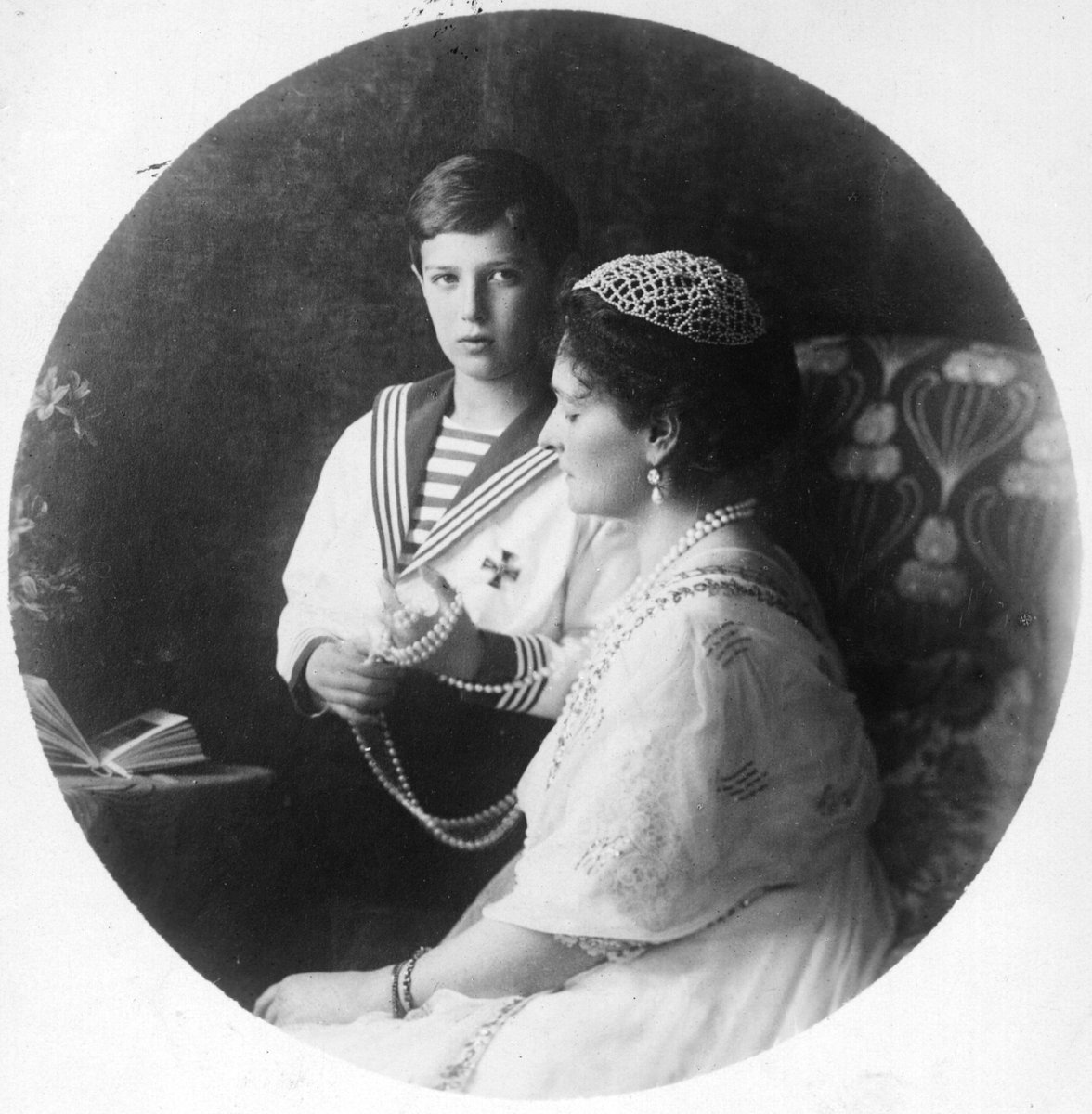
• • •
Missing some Tweet in this thread? You can try to
force a refresh


